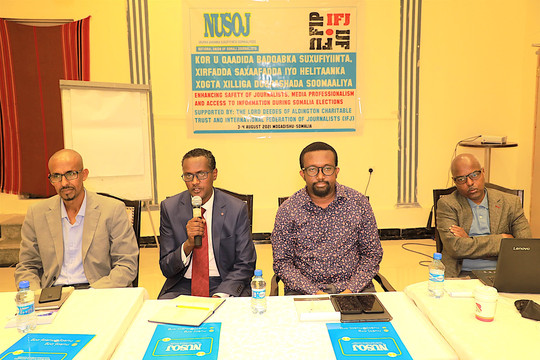The training, financed by the Lord Deedes of Aldington Charitable Trust, focused on essential survival skills for journalists working in dangerous environments, professional responsibility of media during the elections and the importance of access to information for effective reporting.
“Since journalists are charged with the crucial responsibility of keeping people informed about electoral processes, we believe that Somali journalists need to be well trained to acquire skills that enable them to concentrate elections reporting on pertinent issues in an accurate, responsible and impartial manner” said Omar Faruk Osman, NUSOJ Secretary General.
“This training is particularly intended to help Somali journalists to live up to their ethical responsibility by resisting the pull of negative influences from different actors. With Somalia already voting to elect political representatives, the society is looking to media for accurate and credible information about the electoral process” emphasised Osman.
President of NUSOJ Supreme Council Awil Mohamud Abdi stressed that journalists need a secure environment free of harassment and with decent pay to fulfil their professional obligations. “Media thrives on public trust and journalists therefore need to protect that trust by exercising professional judgement” observed Abdi.
Mohamed Hassan Irro, the Chairman of the Federal Elections Implementation Team (FEIT), who was the guest of honour at the opening welcomed the training saying that it would contribute to the development of a professional media cadre in Somalia during this critical electoral period. Irro who highlighted the media’s central role during the current election season, said “journalists should uphold their professional responsibilities to report factually and avoid inflammatory reporting that can cause disharmony in society”.
He supported NUSOJ’s call for increased access to public information for journalists during the elections but cautioned that such access came with a responsibility not to twist facts. “I agree with you that journalists need facts to report accurately and public officials including election officers have a duty to share information in their possession with the media. But the media also need to exhibit goodwill by not distorting such information,” Irro said.
Speaking about the same theme, IFJ General Secretary Anthony Bellanger observed that access to information and professional media was a "chicken and egg" situation. “Unless journalists have access to official information in a timely manner, they will have no choice but to rely on alternative sources of information which may not be so accurate. And in the absence of credible information, journalists will struggle to meet professional expectations. They also need to be physically and materially secure if they are going to fulfil their role independently,” Bellanger said.
He reminded journalists of the importance of personal safety, telling them that no story is worth a journalist’s life. Professionalism, he added, is a culture that is bred through constant adherence to the basic principles of accuracy, fairness and impartiality.
Journalists also need to work in an environment in which their safety is guaranteed, because vulnerable journalists cannot be an effective watchdog over the society. “If journalists are society’s messengers, then it is in the interest of both society and the state that they are protected from harm,” Bellanger concluded.

